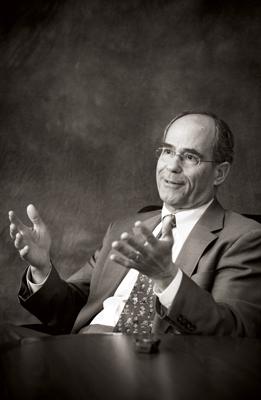Roger Niello has long been one of the most recognizable figures in the Capital Region. During nearly four decades as a business leader and political representative — first on the Sacramento County Board of Supervisors and then in the California State Assembly — he developed a lasting reputation as a devout advocate for the state’s business community. Last November, that devotion led to Niello being named president and CEO of the Sacramento Metro Chamber. We sat down with him recently to talk about the city’s business and political climate and the Chamber’s collaborative Next Economy planning initiative.
Comstock’s: What should Chamber members
expect from you as the leader of this organization?
Niello: Attention to the three primary missions
of the chamber, with the first one being relevance to members. We
are nothing if we don’t have the support of our members. Second,
we need to be the voice of business in the region, and that also
extends to the state and federal level. And then, it’s economic
development. That’s an area I intend to emphasize even more as
the economy rallies. I think we’re starting to see some real
recognizable signs of recovery, but we need to be more involved
in economic development on behalf of the region. An extremely
important part of that is the Next Economy initiative. We’re
looking at specific action items within the region that business
support groups, … higher education institutions and community
colleges and local governments need to work on. If we get to that
action plan, I think we make a much more significant difference
than we have with other collaborative efforts in the past.
Comstock’s: You mentioned the economy is
starting to improve. What are your overall feelings of the
Sacramento economy, where it’s at now and where it might go this
year?
Niello: My crystal ball isn’t any clearer than
anybody else’s, but I see things getting better. The drag now is
real estate. Until we work through the price inflation and glut
of inventory … the economy can’t really start booming. Other
sectors of the economy can and are growing, but we need to work
through this real estate dysfunction. But there’s a good thing
there too: We had lost a bit of our competitive advantage here,
relative to cost of living and doing business, and in a perverse
fashion we’ve kind of fixed that again. So that coming back into
line allows the economy to be on a more even keel relative to
long-term trends. But there are signs that people are building,
and there certainly is more retail activity. I think Roseville
sales tax receipts were up close to 5 percent, and the county of
Sacramento was up 4 percent. So that activity is increasing, and
I would expect it to continue into 2012.
Comstock’s: What can and should the Metro
Chamber be doing to help foster job creation in this
region?
Niello: That’s part of the Next Economy. We’re
at the beginning stage of focusing on four economic clusters that
are the primary drivers of our economy, the part that truly
creates wealth and jobs and which is the economic base. We’re
going to convene working groups for each cluster and ask them,
‘what do you need to succeed and grow?’ We’ll do it through
looking at their entire value chain and what we do and do not
have here. For example, I think everybody here realizes we really
don’t have an adequate existence of venture capital firms,
particularly in the tech areas. One of my other big concerns is
the perception of this area outside the region. Outside of our
government sphere, we do have a truly entrepreneurial population.
The problem is, if you ask somebody from Pennsylvania what they
think about Sacramento, if they know anything, they’ll say it’s a
government town. Phil Jackson used to call it Cow Town — and that
doesn’t bother me because one of our economic drivers is
agribusiness — but this notion of a government town precludes the
perception of innovation and entrepreneurship.
Comstock’s: When we talk about things that
improve the business environment, people usually start with
regulation reform. But what other things are really important to
you in this process that you’re talking about?
Niello: You’re right, we can’t just say,
‘without regulatory reform, there’s nothing we can do about the
economy,’ because that’s not true. There are other aspects that
are extremely important, too. Education is probably the most
important. We need a robust community college system because
that’s where the retraining happens. We need young graduates who
are going to be trained and stay for opportunities here, and
that’s where [Sacramento State and UC Davis] institutions come
in. You need local governments that ease the development of those
assets that a business needs. Permit processes, for instance, can
take extremely long periods of time, particularly if the
regional, established approach to development heavily advantages
infill over greenfield development. I call it the business
development ethic. Do we have an ethic here [within] our
government that [makes] it a high priority for us to foster the
development of the private sector, business end of our community?
Is that a key driving strategy of our local governments? I’ll
leave that as an open question, and each jurisdiction can answer
it as they see fit. But business support groups like the Metro
Chamber and community chambers need to tell local governments how
they feel. That’s an important part of business success in a
region also.
Comstock’s: You’ve been in local and state
government. What is your take on the seemingly endless
dysfunction at Sacramento’s City Hall and how it impacts all
these things we’re talking about?
Niello: First of all, you’re talking
specifically about the city of Sacramento. I think it’s important
to acknowledge that within the six-county region, we have
literally dozens of jurisdictions besides the city of Sacramento
that aren’t so much in the news. Most of the local government we
have here does seem to function pretty well. I think that’s more
the rule in this region than the exception. But even though there
are lots of other jurisdictions, there are concerns about the
city of Sacramento. The large major urban center of a
metropolitan area should be an important regional leader in the
overall success of that region from a governing and political
standpoint. That particular standpoint in our region is
compromised because of the seeming inability of the Sacramento
City Council to be truly collaborative. I’m avoiding using the
word dysfunction, though a lot of people use that and maybe
that’s what it is. I do think everybody would agree that the
function of that city council does not appear to be toward some
beneficial results from a policy perspective. It appears to be
personality driven, and that compromises the city of Sacramento
from being a regional leader with true regional collaboration and
vision.
Comstock’s: What is your perspective on
Mayor Johnson’s executive mayor proposal?
Niello: A city reaches a size and sophistication
and complication at which it really can’t be governed like a
small city. Sacramento is of the size, of the sophistication, of
the complication, that a form of government that works for Citrus
Heights isn’t going to work for Sacramento. Virtually every other
big city in California, and probably in the nation, is governed
with the elected executive and separate elected legislative body
on the model of states. I think it’s high time Sacramento enter
that realm of the big city that it really is. Kevin’s first
proposal that he rolled out two years ago, I didn’t like that
one. That was way too much power for the mayor. But he and the
people he’s working with recognized that. I think the Chamber was
part of those discussions to help move it in the direction where
there’s a little bit more of a balance of powers, which there
needs to be with an elected executive and a separate elected
legislative body. I think the current proposal makes good sense.
It will work better for the city of Sacramento. I personally
favor it, but more importantly the Chamber, which represents a
lot of the businesses in the city of Sacramento, also favors it.
Comstock’s: What’s your feeling about the
arena? Do we have what it takes to get this thing done?
Niello: I don’t know. The parking proposal is
very interesting and was creative, and it was a good thing to
place into the discussion. The troubling thing is they can’t even
move forward on trying to see if it will work. But an arts and
entertainment facility in the middle of the urban core would have
real value to the entire region. I’m not saying we should expect
other areas to pay for it. Although, maybe if things had been
different in the past relative to interaction between the various
jurisdictions, that could be different. The point is, the value
of that development is extremely positive; there’s no question
about that in my mind. But can we get there? The simple answer is
I don’t know.
Recommended For You

Command and Deliver
Sacramento's young professionals are gaining influence
No agency is safe. No office off limits. Boardrooms will be infiltrated. Communication barriers will crumble for the sake of collaboration. As the old guard inches toward that horizon called retirement, Sacramento’s young power players are taking center stage.

The MBA is Not Dead
Demand has ebbed and flowed but remains on high tide
When Laurie Grimsman graduated in June from the Graduate School of Management at UC Davis, she was 51 and a self-proclaimed “age outlier.”



